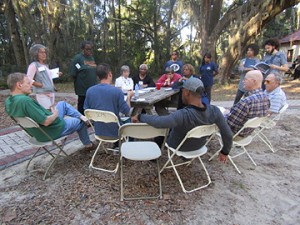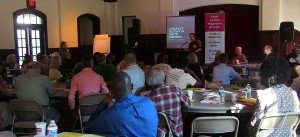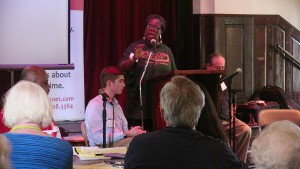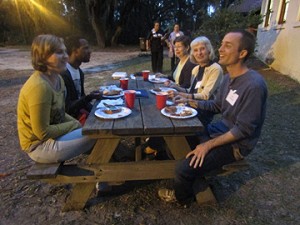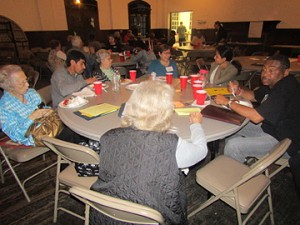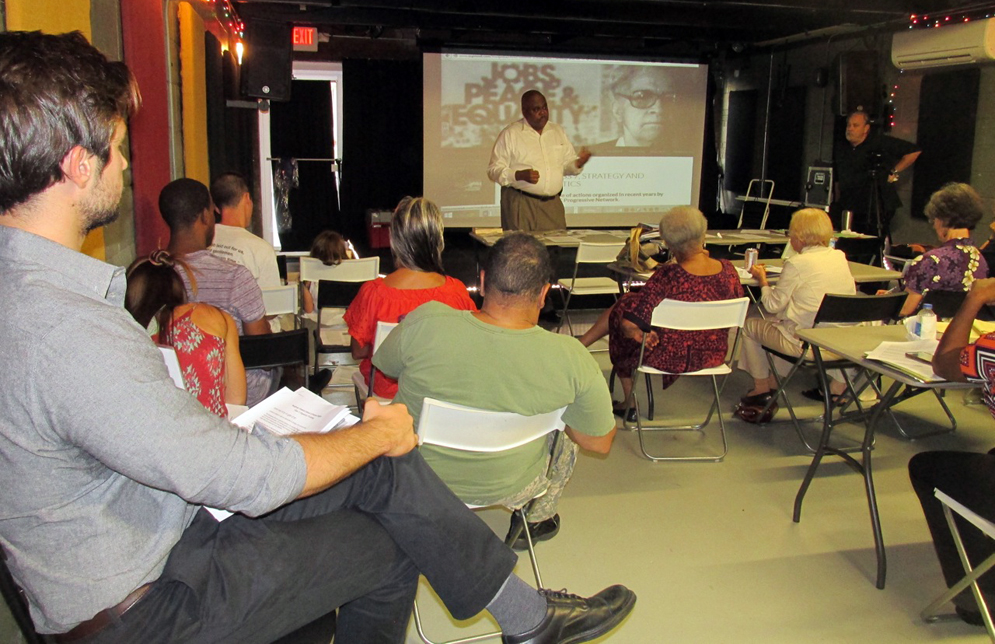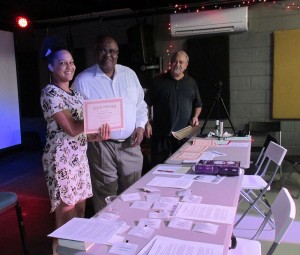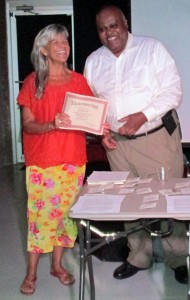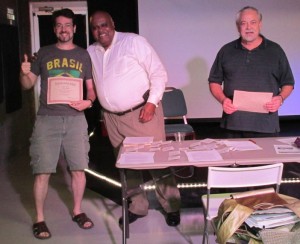Grassroots activists from across the state met Oct. 23-25 at the SC Progressive Network‘s annual fall retreat at Penn Center in St. Helena, near Beaufort. It was a full weekend of networking, organizing, and mapping plans for the coming legislative session – and beyond.
Saturday morning was spent on Network business: reports from the 11 member groups present and updates from our chapters (Charleston, Columbia, Rock Hill and Spartanburg). The body also approved a bylaws change to establish caucuses within the Network so members can organize around issues and specific constituencies. At Penn, participants caucused on racial justice, women’s rights, and young people. They will identify and promote their own priorities, set their own meeting schedules and develop their own leadership.
Graham Duncan and Meeghan Kane, who taught portions the summer session of the Network’s Modjeska Simkins School, led a short course on the people’s history of South Carolina. Brett Bursey talked about the history of Network, and its precursor GROW.
The afternoon was given over to a strategy discussion for 2016, centered on a four-pronged approach to: educate, agitate, legislate, and litigate. Reps. Gilda Cobb-Hunter (Orangeburg) and Joe Neal (Richland) – members of the newly formed SC Progressive Legislative Caucus – led a session on the state of voting rights. They were joined by George Eppsteiner, staff attorney for the Southern Coalition for Social Justice.
The main consideration for shaping our strategy about voting rights is recognizing that the system has been rigged by partisan gerrymandering. As the dominant Republican Party has been allowed by the US Justice Dept. to draw legislative districts that create majority-black and white districts, the winners will be chosen in primaries that fewer than 10% of the citizens decide. Accordingly, the Network’s strategy includes grassroots education and agitation around the nation’s least-competitive elections. This educational effort will reflect legislative proposals to restore democracy through creating competitive political districts and other voting methods. These efforts will be capped off by possible litigation challenging the rigged nature of elections.
That session segued into a facilitated discussion on this state’s most insidious problem – institutional racism – and practical ways the Network can address systemic oppression in South Carolina. The panel included Kevin Alexander Gray, Rep. David Mack, and Laura Cahue of Somos SC.
Participants then broke into work groups, joining issue caucuses or attending workshops on the Network’s Missing Voter Project (led by Kyle Criminger) and Racial Profiling Project (led by Kevin Gray). The Racial Justice caucus and the Immigrant Rights caucus joined the discussion around the Network’s Racial Profiling Project as a “shovel ready” tool to organize against racial injustice anywhere in the state. Laura Cahue reported that Latinos are being targeted by police in traffic stops that often result in jail and deportation. Rep. Neal wants the Network to help coordinate racial profiling complaints from Latino communities to the SC Progressive Legislative Caucus.
Network Caucus contacts:
- Youth@scpronet.com (Daniel Deweese)
- RacialJustice@scpronet.com (Kevin Gray)
- SCImmigrantRightsCaucus@scpronet.com (Laura Cahue)
- Women@scpronet.com (Cynthia Beavin)
In the evening, everyone gathered at picnic tables under giant oaks to dine on Gullah Grub’s fried fish and fixin’s, then went inside Frissell Hall to sing along with the fabulous Dave Lippman.
On Sunday morning, caucus representatives gave reports on their work and next steps. Among other Network business, it was decided to postpone elections for Network officers until our annual spring meeting.
Rep. Cobb-Hunter offered a legislative forecast for 2016, which was followed by discussion on bills we will introduce and promote.
After lunch, the SC Progressive Voter Coalition (SC ProVote), the electoral arm of the Network, met to discuss GOTV priorities and involvement in upcoming state and local races. They were later joined by progressive activist and tax reform expert Mike Fanning, who is running for state Senate (Dist. 17: Chester, Fairfield and York). After a rousing presentation, he earned the group’s endorsement.
Before adjourning, the body rejected a resolution to support a presidential candidate, as that would break with the Network’s state-based strategic model.
Our thanks to everyone who made time for a very long, but ultimately productive weekend. We will keep you posted about progress with the emerging caucuses and Network chapters.
For information on joining a caucus or creating a Network chapter in your area, or to schedule a Missing Voter Project or Racial Profiling Project training for you or your organization, call our office at 803-808-3384 or email network@scpronet.com.
See more snapshots from the weekend at Penn Center in our photo album.

